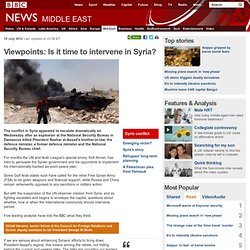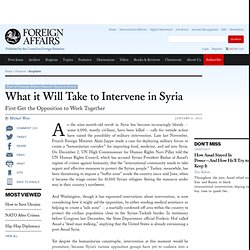

Www.brandeis.edu/crown/publications/meb/MEB64.pdf. Viewpoints: Is it time to intervene in Syria? 18 July 2012Last updated at 23:59 ET The conflict in Syria appeared to escalate dramatically on Wednesday after an explosion at the National Security Bureau in Damascus killed President Bashar al-Assad's brother-in-law, the defence minister, a former defence minister and the National Security Bureau chief.

For months the UN and Arab League's special envoy, Kofi Annan, has tried to persuade the Syrian government and his opponents to implement his internationally-backed six-point peace plan. Some Gulf Arab states such have called for the rebel Free Syrian Army (FSA) to be given weapons and financial support, while Russia and China remain vehemently opposed to any sanctions or military action. But with the suspension of the UN observer mission from Syria, and as fighting escalates and begins to envelope the capital, questions about whether, how or when the international community should intervene persist. Five leading analysts have told the BBC what they think. Continue reading the main story. HOLMES: The failure of an idea.
The United Nations Security Council passes a resolution noting “widespread and systematic attacks” on civilians and authorizing U.N. member states “to take all necessary measures … to protect” them.

It invokes a little-known concept called the responsibility to protect (or R2P) as justification for the use of force to stop the slaughter of civilians. Against which nation did the Security Council take this action? No, it wasn’t Syria. It was Libya. U.N. So why is there a so-called “responsibility to protect” Libyans but not Syrians? There are obvious reasons why the Obama administration advocated the use of force in Libya but has not in Syria. The use of force in Syria may indeed be impractical.
The mistake R2P supporters make is using the idea to justify military intervention. Some R2P supporters recognize the dilemma caused by the Libyan intervention. But it’s those circumstances that dilute the moral power of R2P as a justification for using force. Canadian International Council. Failing the Syria test. What it Will Take to Intervene in Syria. As the nine-month-old revolt in Syria has become increasingly bloody -- some 6,000, mostly civilians, have been killed -- calls for outside action have raised the possibility of military intervention.

Late last November, French Foreign Minister Alain Juppe made a case for deploying military forces to create a “humanitarian corridor” for importing food, medicine, and aid into Syria. On December 2, UN High Commissioner for Human Rights Navi Pillay told the UN Human Rights Council, which has accused Syrian President Bashar al-Assad’s regime of crimes against humanity, that the “international community needs to take urgent and effective measures to protect the Syrian people.” Turkey, meanwhile, has been threatening to impose a “buffer zone” inside the country since mid-June, when it became the triage center for 10,000 Syrian refugees fleeing the massacre under way in their country’s northwest.
To continue reading, please log in. Don't have an account? Register Have an account?